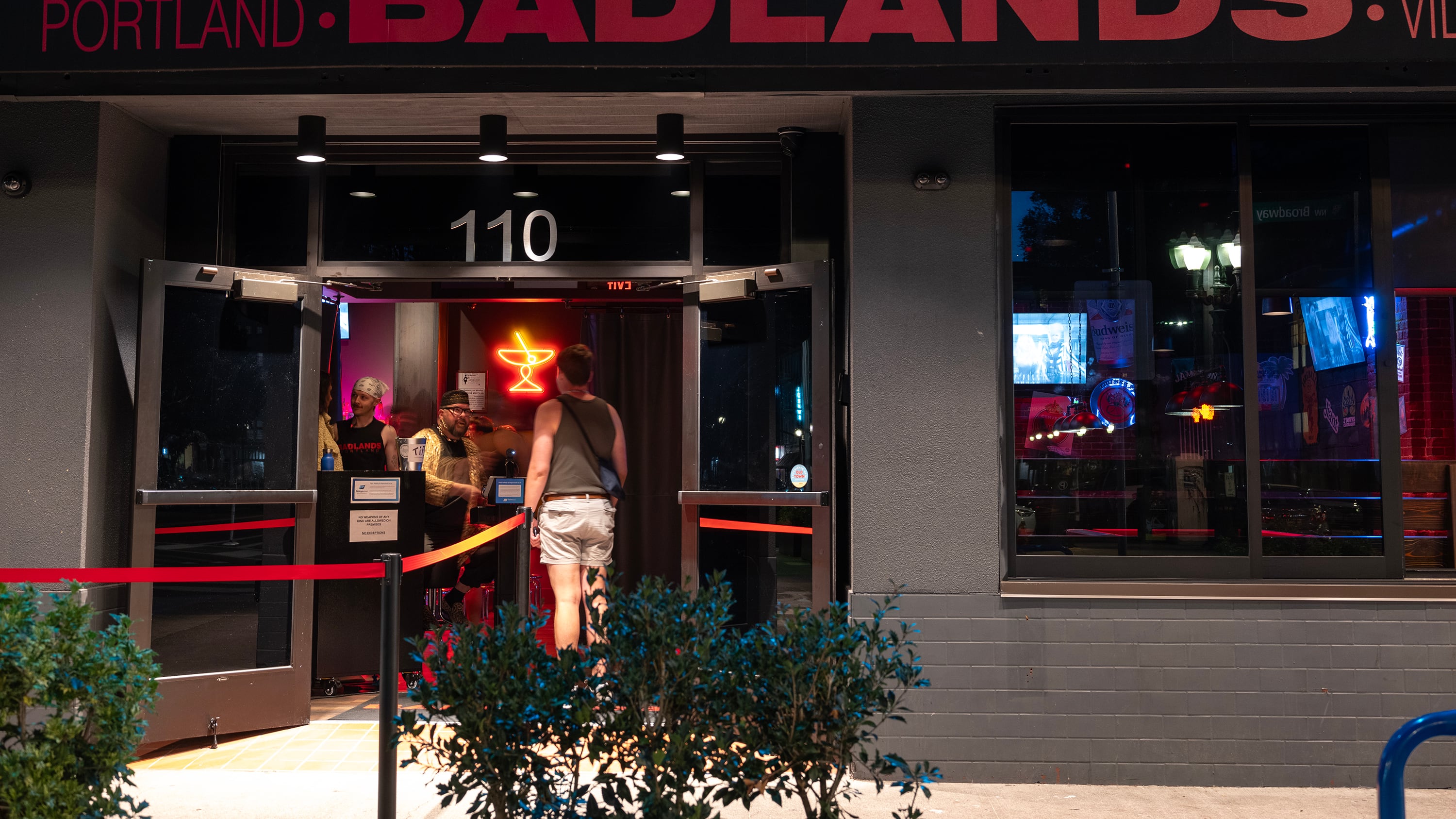When patrons approach the recently opened Old Town queer bar and dance club Badlands, they are greeted with rainbow flags on poles, signs that say “Live With Pride”—and an identification verification system that is raising eyebrows.
“Hi, doll, step right there so I can take a picture of your handsome face,” says RoRo Morales, the doorperson, to one of the first customers of the night.
The machine, called Patronscan, snaps a picture of the customer while Morales scans his license. The customer balks.
“You’re recording me?” the patron asks.
“No, it’s just taking a picture to compare your face to the ID, and then it deletes it,” Morales says. “If I had to do this all day,”—Morales mimes looking at the customer’s face, then putting on glasses to check his ID, then looking back at his face—”I’d get a migraine.”
The customer shrugs, stands for the picture, and meets his friend inside for a beer.
The interaction was a perfect example, Morales says, of what happens when a customer gets skeeved out by the hot breath of Big Brother down their neck. It’s about one out of every 20 customers these days, Morales says, though it was much more in the weeks right after Badlands opened June 12.
Badlands is part of a California-based chain of video bars. But running Patronscan in Portland comes with a complication the ownership doesn’t have in San Francisco or Sacramento: It’s illegal to use facial recognition technology in both public and private spaces here. That includes bars.
Patronscan bills itself as the bouncer that never forgets a face. According to the Calgary, Alberta-based company (and the blue sign in the Badlands entrance), people’s personal information is permanently deleted from the Patronscan system within 21 days if they are not involved in an “incident.” If the customer is flagged in the system for, say, starting a fight, the bar can save their name, date of birth, gender, postal code and photo for up to five years (private flag). They may choose to share the data with other establishments for up to one year after the incident (public flag).
“How it operates is simple, but what it does is rather sophisticated,” says Marko Mlikotin, Patronscan’s spokesperson. “Years ago, bouncers just kept a notebook at the front door and the fundamental shortcoming with that is staff changes from shift to shift. This technology serves as an electronic bouncer.”
Patronscan launched in 2005 and operates in 743 cities internationally, according to the company. Mlikotin would not disclose if other Portland bars use it or how many. The Badlands locations in California also use Patronscan, according to Morales. Badlands management did not respond to requests for comment.
The customer who questioned getting his picture taken at Badlands declined to give his name, but did say he’s 63 years old and has been coming to this bar for more than 40 years, back when it was Embers. While settling into his beer, he had choice words about Morales’ assertion that the photo was used only to verify his license.
“Well, that’s bullshit,” he says. “But I sold my soul to the devil with Google years ago. It’s the price of admission.”
The cavernous Badlands space at Northwest Broadway and Couch Street is 8,000 square feet and boasts 40 video screens for music videos, plus billiards tables and at least eight bars. In addition to karaoke nights on Tuesdays and Wednesdays, Badlands has been hosting regular drag shows, trivia, Latin nights, and one-off events like last month’s Charli XCX “brat party.”
Badlands customer Jared Warby was out on the sidewalk getting some fresh air after bringing down the house with his karaoke rendition of Bobby Darin’s “Mack the Knife.”
Warby didn’t even notice that his picture was taken at the door but is grateful for the extra security, especially in a gay bar. (A crime ring in New York City drugged and robbed 16 victims in 2021-22, many of them gay men, at bars and nightclubs.)
“I like that they’re vetting people and not just letting crazies in off the street,” Warby says. “If you want to remain discreet, there’s apps for that.”
Using Patronscan in Portland comes with an extra wrinkle: In 2020, the Portland City Council voted unanimously to ban facial recognition software, like San Francisco and Boston had already done.
Facial recognition technology is notorious for routinely falsely identifying women and people of color—the software is sexist and racist, basically. That could have huge implications, such as racial profiling and false arrests, when used by law enforcement.
“Many of the concerns that prompted the development of this policy in 2020 are still relevant in 2024,” says Julian Hanlon-Austin, spokesman for Smart City PDX, the division of the Portland Bureau of Planning and Sustainability that focuses on data and technology. “The responsible use of technologies with the risk of bias and discrimination will continue to be a policy development priority.”
But Portland still remains the only city in the country to ban both public and private use. No problem, since Patronscan is not facial recognition technology, it’s simply an ID-verification system, says Mlikotin, the company spokesperson.
“Patronscan serves two primary purposes: verify government IDs to prevent underage drinking and, second, it flags patrons who have a history of bad behavior,” Mlikotin says. “Protecting places of business is good business.”
Industry watchdogs back up Mlikotin’s assertion that Patronscan is legal in the Rose City. Brian Hofer, chair and executive director of San Francisco-based nonprofit Secure Justice, which advocates against government and corporate overreach with surveillance technologies, says collecting photos to verify IDs is not a violation of Portland’s ban and not a true use of facial recognition technology.
Hanlon-Austin had not heard of Patronscan before WW brought it to his attention. According to Hanlon-Austin, the onus of enforcement falls on the public and “other private entities,” not the city. “The city is not actively monitoring the use of face-recognition technologies,” he says.
While perhaps skirting the line of legality, Patronscan doesn’t quite pass Hofer’s gut check. “It does look like they’re collecting a lot of information that feels creepy–which bar you last went to, when you went there, how often you go there.”
Morales, the doorperson, has only flagged one Badlands clubgoer in the bar’s first two months of operation—a drunken woman who was touching other patrons without permission and making racist comments. Security removed her from the club, and Morales flagged her in Patronscan. She’s not 86′d permanently, but whoever is working the door next will be able to see she was ejected this summer and decide whether they want to admit her again.
Morales has lived in Portland for 12 years but has worked in nightlife a long time, including as a doorperson at legendary New York City nightclubs Limelight, Tunnel and the Palladium in the ‘90s. Morales would be happy to see Patronscan expand to other Old Town venues, such as Darcelle’s, CC Slaughters and Silverado, so they could more easily communicate with each other about safety issues.
“This is a safe space for everybody and my job is to keep everybody safe,” Morales says. “That’s all this is.”

